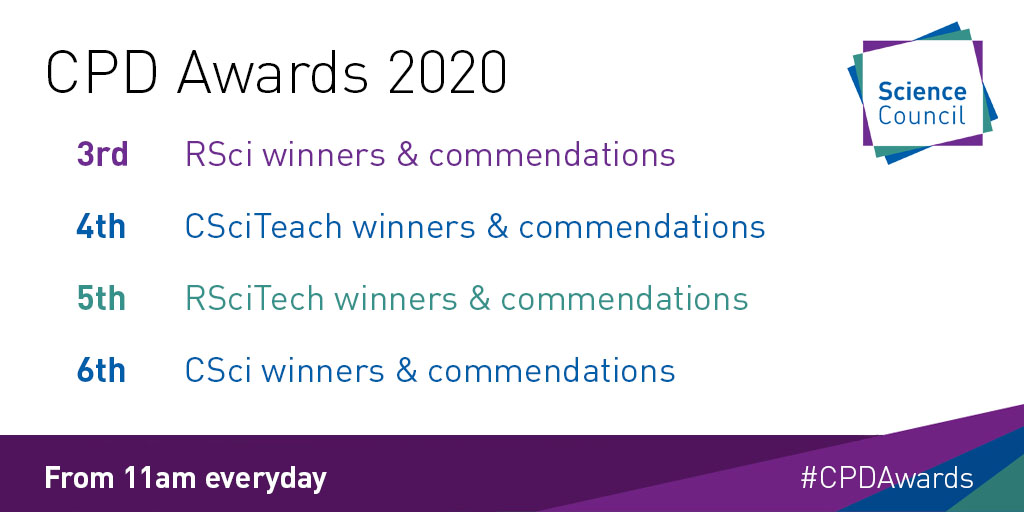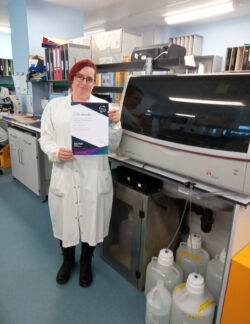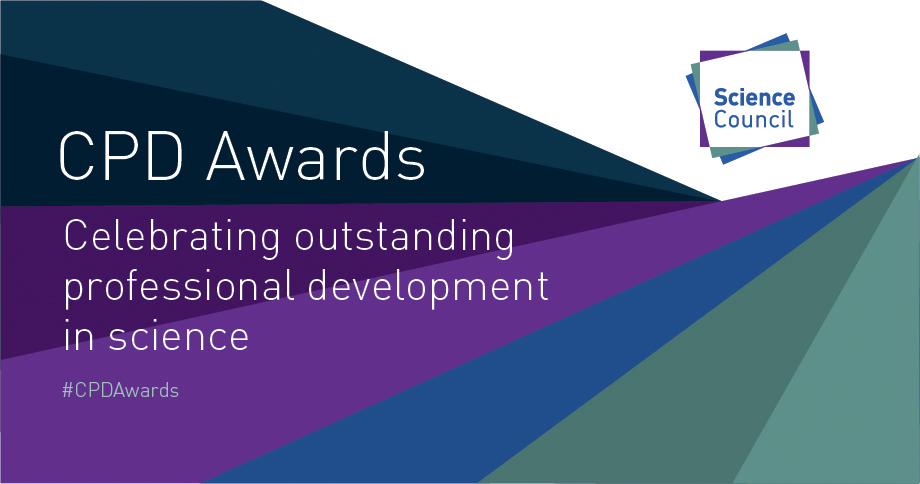
CPD Awards 2020: Top Tips
The CPD Awards are back for 2020! This year, our winners and commendations have shared their top tips for CPD. Check below to find out how you can level up your professional development.
6th November:
Rebecca Quest, CSci Winner
Take a step back and look at your current situation. Consider how you would like to develop it and what you want to achieve then work out what you need to learn and how you are going to do it.
Choose CPD activities that interest you, inspire you or challenge you. The more interesting you find something, the more you’re likely to learn from it. Use CPD as an opportunity to try something new.
Record little and often so it doesn’t become an overwhelming task. Prompt reflection also helps to emphasise those light bulb moments and put them into practice. Choose a method of recording activities that is easy, accessible and which works for you.
Caroline Jarrett, CSci Commendation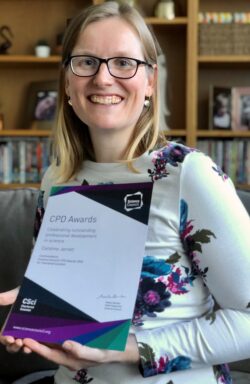
Keep an up to date evolving record of your CPD: as soon as you book onto a training course or start a project begin compiling key details and think about which activity categories it aligns with. For instance, keeping the information and details sent when you sign up to an event provides a great framework for reminding you of the topics covered. Creating a record that grows little by little is much easier than trying to remember everything with a fast approaching deadline, it also acts as a great confidence boost demonstrating the continual progress you have made and the goals you have achieved.
Make time for personal development: it is easy to see CPD as a luxury and not our highest
priority, especially when workload is high. Allocating time to CPD is really important, it can lead to longer term personal improvements and efficiencies as well as connecting us with others who may be able to provide knowledge and support.
Weave in training or CPD that not only increases your knowledge and skills but supports you in your day to day role: demonstrating immediate benefit to you, your colleagues and your employer creates a solid business case for carrying out the CPD. Think about how you may share what you learn, perhaps giving an overview of the key points could benefit collective team knowledge. Reflect on what you learned, how it benefits you and others and how you might make the most of your new skills – maybe it will inform your next project or training opportunity.
Janice Harland, CSci Commendation
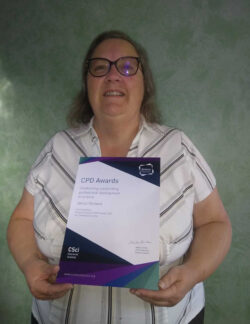 Take advantage of any opportunities to extend your knowledge and skills. This includes but is not exclusively opportunities made available by the professional bodies and employer. Recently for example several companies have been producing webinars , either for live participation or to view at a convenient time after the live broadcast – these can be really helpful to learn about both new technologies and new applications of existing ones (though be aware of the inherent sales pitch!)
Take advantage of any opportunities to extend your knowledge and skills. This includes but is not exclusively opportunities made available by the professional bodies and employer. Recently for example several companies have been producing webinars , either for live participation or to view at a convenient time after the live broadcast – these can be really helpful to learn about both new technologies and new applications of existing ones (though be aware of the inherent sales pitch!)
Reflect on the everyday. It doesn’t have to be a critical incident, you can reflect on what is going well and analyse why so that potentially you can apply these practices to other aspects of your work. CPD is not just about correcting what is not working well or making good any deficiencies but about identifying and building on strengths, consolidating practice, and evidence based judgements.
Periodically evaluate performance or activity over a period of time. For instance I looked back over several years of CPD in order to identify the times and types of activity I was using most frequently, look for how I could do more/better and also find gaps where I could seek additional activities to broaden my experience. I also reflected on how my role had changed over time, and drew out the cogent parts of a role in order to pass it on to someone else. All reflection is good!
Kranthi Maniam, CSci Commendation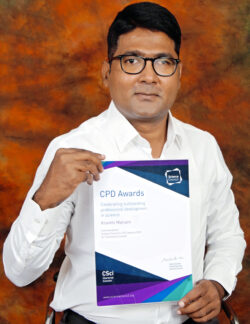
Identify and Plan: Identify your key areas of improvement that are likely to have a significant impact on your professional development, and the range of learning activities that will reflect on your current role/future aspirations. Plan your objectives in a clear and SMART (Specific, Measurable, Achievable, Realistic, Time-bound) way. Try not to choose too many objectives.
Push yourself hard: To execute the planned activities, you need to push yourself harder to ensure you achieve them with patience, perseverance and resilience. Achieving the objectives shall help to build your core competencies and can make a significant difference in your perception, professional and personal career.
Apply and share: When you have done some training or other development activity, it is important to apply it in your practice. Applying what you have learnt to your own job makes you a conscious competent professional. Sharing your learning with others either in terms of knowledge sharing presentations or trainings shall benefit the users of your work and help you identify new areas for development as well as help you to refine/refresh what you have learnt.
Record and review: Recording your findings shall demonstrate how your skills and knowledge have developed, while reviewing them shall enable you to identify the shortcomings in learning activities and additional development needs. Remember CPD is an ongoing learning process which keeps you active throughout your professional life.
5th November:
Russell Wilson, RSciTech Winner
Katy Johnson, RSciTech Commendation
Your colleagues have a vast amount of knowledge between them don’t be afraid to ask them questions or get them to quiz you.
Don’t forget they all had to learn the same things you are learning their experiences may help you.
Write everything down in real time (keep a CPD diary) you can always ‘’polish’’ it up later
Take time out to consider what you have learnt and achieved you may surprise yourself.
Adam Roche, RSciTech Commendation
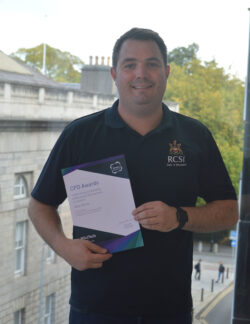
Collaborate in order to innovate. It can sometimes be difficult to come up with new solutions and ideas, sit down with your manager to discuss areas of simulation which could perhaps be improved upon. Also, talk to learners & faculty, brainstorm ideas with them in both quantitative and quantitative fashion. We are currently launching our brand new simulation innovation committee, which is a mutually beneficial working group comprising a mixture of undergraduate health science students. It’s amazing what can be achieved by collaborating and having conversations with key stakeholders.
Continuous learning. Simulation is a rapidly evolving science and a good way to keep ahead of curve is to enroll in programmes, courses and attend conferences. Some universities offer simulation learning programmes which are fully online, making them highly accessible. Attending and presenting at conferences can motivate you to create new projects to present, and it is very worthwhile to listen to other talkers in attendance.
It is vitally important to keep track of all your CPD throughout the year as you go along. Create an interactive form on a share drive, record all your CPD activities on this as the year progresses. This ensures nothing is missed and is saved all in one place. There is nothing worse than doing a CPD return from the beginning when the deadline is fast approaching.
4th November:
Sarah Earle, CSciTeach Commendation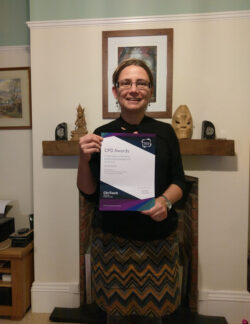
Be strategic: You can’t do everything, so to help you decide which things to ‘say yes’ to, think about your goal: what are you aiming to do? Will this help?
Side-step out of your comfort zone: Try something new in a familiar context, or try something familiar in a new context (e.g. an old strategy with a new class/group).
Be Brave: Don’t assume that others are doing what you are. Sharing your experience will support others.
3rd November:
Sarah McCafferty, RSci Winner
Think about CPD differently – I think some people don’t think about things they do as part of their role as CPD, but it absolutely can be, if you’ve read a scientific paper to get a better understanding of something in your role or trained a colleague, if these have added to your knowledge or skills then it probably counts as CPD.
Find activities you enjoy – CPD should be about you, and while it’s good to be pushed out of your comfort zone, you shouldn’t dread doing CPD!
Think longer term – What are your longer-term goals, how does this CPD fit in with that goal? Having a plan will allow you to better focus on the activities that are most beneficial to you.
See Sarah’s winner’s video here.
Manik Puranik, RSci Commendation
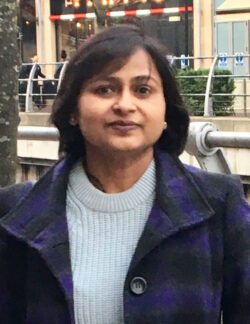 Keep a record of every event: I keep the records of all the events in my diary with dates and duration and took every opportunity to attend it and use it in my daily activities/routine. I am not successful every time, I give my best.
Keep a record of every event: I keep the records of all the events in my diary with dates and duration and took every opportunity to attend it and use it in my daily activities/routine. I am not successful every time, I give my best.
Go an extra mile: This means I was going outside my comfort zone and from my busy schedule to achieve this. Many times, I thought why I am pushing myself so hard, however, in the end, it was all worth that effort when you been recognised and appreciated.
Do not make CPD as a task, use it as a booster to improve yourself: In my CPD I have not only included technical aspects but also covered other aspects ranging from Online courses, attending the webinar, face to face seminars, attending workshops etc. CPD is not just for you. It is an opportunity to give back what you learn to the wider community e.g. your workplace, colleagues, students and of course people outside your workplace.
We’re announcing our winners and commendations throughout the week 3rd- 6th November. Be sure to check back tomorrow to see more outstanding CPD!
